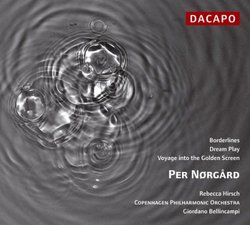| All Artists: Per Norgard, Giordano Bellincampi, Copenhagen Philharmonic Orchestra Title: Per Nørgård: Borderlines; Dream Play; Voyage into the Golden Screen Members Wishing: 1 Total Copies: 0 Label: Marco Polo Release Date: 2/17/2004 Genres: International Music, Classical Styles: Europe, Continental Europe, Forms & Genres, Concertos, Historical Periods, Modern, 20th, & 21st Century, Instruments, Strings, Symphonies Number of Discs: 1 SwapaCD Credits: 1 UPC: 636943601426 |
Search - Per Norgard, Giordano Bellincampi, Copenhagen Philharmonic Orchestra :: Per Nørgård: Borderlines; Dream Play; Voyage into the Golden Screen
 | Per Norgard, Giordano Bellincampi, Copenhagen Philharmonic Orchestra Per Nørgård: Borderlines; Dream Play; Voyage into the Golden Screen Genres: International Music, Classical |
Larger Image |
CD Details |
CD ReviewsThe first major "infinity series" work plus two other fine p Christopher Culver | 11/22/2005 (5 out of 5 stars) "This disc by Da Capo, Denmark's national music label, contains three orchestral pieces by Danish composer Per Norgard. Two are from his "infinity series" period of the late 60s and 70s and the third is his second violin concerto from 2002. Giordano Bellincampi leads the Copenhagen Philharmonic Orchestra, with a spotlight on violinist Rebecca Hirsch in the concerto.
Per Norgard's great contribution to musical composition is the "infinity series", a amazing method of serializing melody that creates self-similarity among orchestral parts, an unsuspecting application of fractal mathematics to music. This principle was first overtly displayed in "Voyage into the Golden Screen" (1968), and listening to this piece is the best way to grasping the technique. The first movement of the two-movement work is a droning confrontation between two instrumental planes, one in G and the other in A flat. In the second movement, however, Norgard writes the entirety with the infinity series: a given melody is played by the flutes in what can be called "normal time", while the oboes play every fourth note, the trumpets every 64th note, and tubular bells, trombones, and piano ever 256th note. As a result, the very same music can be heard at many different speeds depending on which orchestral group one concentrates on, and if one listens to the music as a whole one hears a blissful succession of notes that is predictable enough to be easily accessible yet contains many surprises. What Norgard did with this technique is marry what usually seems like two anthetical traditions, the mathematical complexity of the post-serialists (Boulez, Gubaidulina...) and the utter simplicity of the minimalists (Reich, Part...). The infinity series again served as the basis for an entire composition in Norgard's "Symphony No. 2" of 1970, though this time in grander proportions, but Norgard soon came to understand that even stronger effects could be created by laying out the infinity series and then intervening in its otherwise exceptionless succession, so that new melodies arise from the basic melody. This he does in "Dream Play" (1975, rev. 1980), a music box-like piece where various instrumental parts contend with one another while still being subject to the ritual dance of the infinity series. At the end of the 1970s Norgard's style changed completely from the large scope of the infinity series to an interest in schizoid collections of smaller components inspired by the Swiss mad artist Adolf Wolfli. "Wie ein kind" for choir of 1980 was the first work in this vein, and continued for a decade or so. But ultimately Norgard has reached a last style, using every technique he has ever learned, from the infinity series (now with previously overlooked alterations), to the violence of the Wolfli period, to a new use of rhythm and tempo. "Violin Concerto No. 2: Borderlines" (2002) is a product of this new era. Here, the orchestra uses two different keys, a seven or twelve-note scale as is common in traditional music, and a microtonal harmonics. The soloist is forced to constantly change his intonation to make some dialogue with the orchestra, creating a sense of danger and standing on shaky ground that gives the title of the concerto. This is the least immediately accessible work on the disc, but rewards the effort to understand its principles. This disc is probably the best introduction to Norgard's infinity series technique. And since the infinity series is my favourite aspect of his music, I'd say it was a great introduction to the composer in general. One couldn't go wrong, however, with the Chandos disc with his sixth symphony and "Terrains Vague" either. A thoroughly awe-inspiring artist, I have no idea why Norgard hasn't gotten the same attention as many of the other important composers of today." |
